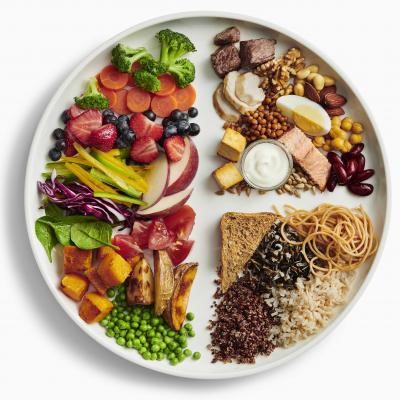Looking at what you eat, how much you eat and how much physical activity you get are important steps to keep your mind and body in good health.
Healthy eating doesn’t have to be complicated. It’s about finding balance and moderation. But what exactly is involved in keeping a healthy, balanced diet? Canada’s Food Guide is a great place to start.
Healthy eating starts with choosing a variety of healthy foods each day—fresh, frozen, canned or dried. This includes eating more plant-based foods, like fruits, vegetables, whole grains and beans, and limiting highly processed foods, like salty and sugary food and sugar-sweetened drinks. 
Eat more fruits and veggies
- Vegetables and fruits are packed with nutrients, such as vitamins, minerals and fibre. They help you maintain a healthy weight by keeping you full longer.
- Try to fill half your meal with colourful fruits and vegetables every time you eat or snack.
- Eat 5 or more servings of fruits and vegetables each day.
- Whole grain foods, such as oats, brown or wild rice and whole wheat pasta, are a rich source of fibre, protein and vitamins.
- Whenever possible, choose whole grain options instead of refined grains, like white bread and pasta, which are low in nutritional value. Because they are digested quickly, refined grains also raise your blood sugar more than whole grains.
- Try to fill one-quarter of your meal with whole grain foods.
- Choose protein foods that come from plants more often. Examples include beans, peas, lentils, soy products (e.g., tofu), nuts and seeds.
- Limit how much red meat (e.g., beef, pork, lamb, goat, etc.) you eat, which may increase cancer risk. Eggs, skinless poultry, fish and shellfish are healthier alternatives.
- Try to fill the remaining one-quarter of your meal with protein foods.
- Limit your intake of highly processed and prepared foods, such as sugary drinks, fast food and desserts. These foods tend to be high in salt, sugar and saturated fats.
- Eat little to no processed meats (e.g., bacon, ham, sausages, chorizo). There is evidence that eating high amounts of processed meats increase the risk of bowel (colorectal) cancer.
- Replace or limit sugary drinks (e.g. fruit juices, soda, and energy drinks) with water instead. It’s a great way to quench your thirst and to stay hydrated without the extra calories.
- Do your best to limit how much alcohol you drink. There are strong links between alcohol and many kinds of cancers.
When deciding what to eat, it’s important to remember that everyone’s meal can look different. Taste, culture, budget and lifestyle will all play a role into what your dish looks like. The key is to have a meal that is nutrient-rich, made up of roughly half fruits and vegetables and the rest whole grains and proteins, whenever possible.
Check out Canada’s Food Guide for more information and tips on choosing foods, planning meals, recipes and more.
In British Columbia, we have many delicious food options. The trick is to enjoy these tasty foods in moderation as part of a healthy, balanced diet.
Whether you’re dining out or at home, try some of these ideas to help you eat healthier:
- Choose foods made with healthier cooking methods. Look for words like baked, steamed, poached, broiled or grilled.
- Choose healthier menu items when dining out. When thinking about which option to go with, ask for the nutritional information of an item you want to order on a menu.
- Limit sauces, gravies and dips because they add extra calories and can have high amounts of fat and salt. Try drizzling some olive oil, lemon or vinegar for extra flavour instead.
- Read nutrition labels on foods to choose products that contain less saturated fat, sugar and salt (sodium).
- Make meals and snacks using ingredients that have little to no added sodium, sugars or saturated fat.
- Snacks can add up! Put snacks on a plate or in a bowl so you can see how much you eat.
If you have any questions about healthy eating, food or nutrition, call 8-1-1 toll-free in B.C. to connect with a registered dietician. Visit the HealthLink BC Dietician Services page for more information.
